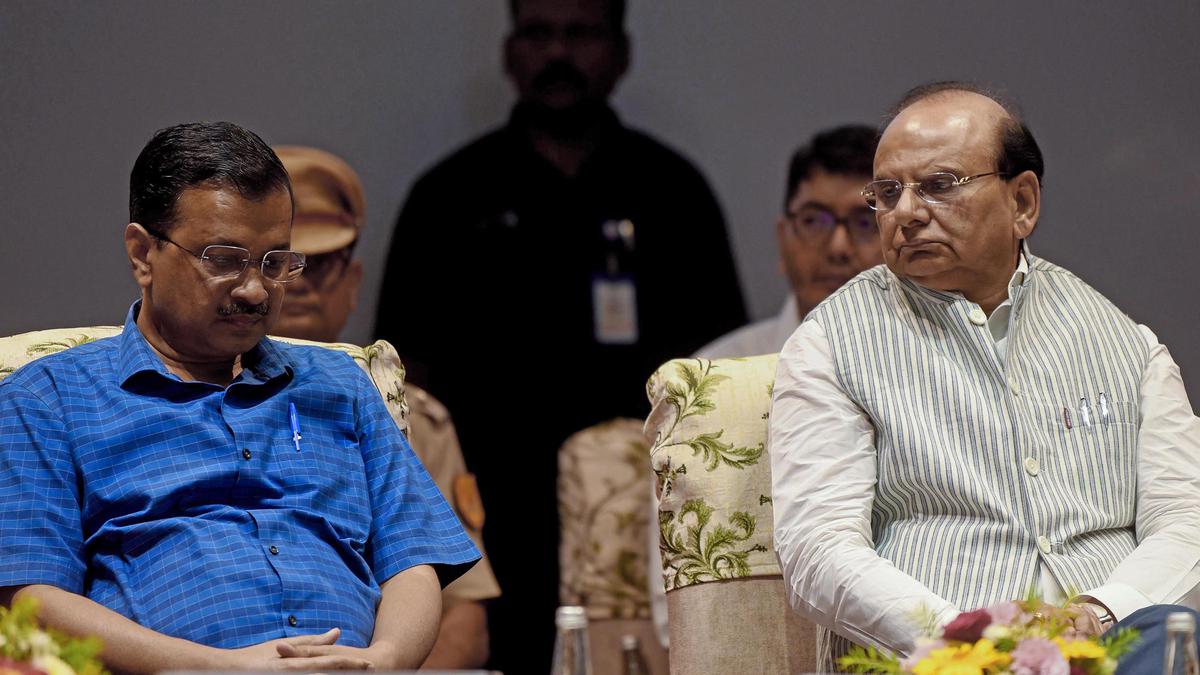
LG's move to stop specialists' engagement will throttle government's work: Delhi CM Kejriwal
The Hindu
Stopping the engagement of specialists and advisors will “completely strangulate” the Delhi government and its services, Chief Minister Arvind Kejriwal said on July 6, hoping the move will be quashed by the Supreme Court.
Stopping the engagement of specialists and advisors will "completely strangulate" the Delhi government and its services, Chief Minister Arvind Kejriwal said on July 6, hoping the move will be quashed by the Supreme Court.
Mr. Kejriwal's remarks came days after Lt Governor V.K. Saxena approved the termination of engagements of 400 specialists working with the Delhi government.
In a follow-up to the mass removal, the services department on July 5 wrote to different departments and agencies of government to stop the engagement of persons as fellows and advisors without the approval of the LG.
“This will completely strangulate Delhi’s goernment and its services. I don’t know what does Hon’ble LG achieve by doing all this? I hope Hon’ble SC immediately quashes it,” Mr. Kejriwal said in a tweet on July 6.
Mr. Saxena terminated the services of around 400 'specialists' appointed by the Kejriwal government in different departments, citing alleged irregularities in recruitment.
"... All the departments/organizations/boards, etc. under Govt. of NCT of Delhi are therefore directed... All the departments shall immediately stop engagements of all the Fellows/Associate, Fellows/Advisors/Dy. Advisors/Specialists/Senior Research Officers/Consultants, by whatever name, wherein approval of the Hon'ble Lt Governor, Delhi has not been obtained till date," said the Services department order.
It also asked the Finance Department not to release salaries henceforth for those engaged without the LG's approval.

“Writing, in general, is a very solitary process,” says Yauvanika Chopra, Associate Director at The New India Foundation (NIF), which, earlier this year, announced the 12th edition of its NIF Book Fellowships for research and scholarship about Indian history after Independence. While authors, in general, are built for it, it can still get very lonely, says Chopra, pointing out that the fellowship’s community support is as valuable as the monetary benefits it offers. “There is a solid community of NIF fellows, trustees, language experts, jury members, all of whom are incredibly competent,” she says. “They really help make authors feel supported from manuscript to publication, so you never feel like you’re struggling through isolation.”

Several principals of government and private schools in Delhi on Tuesday said the Directorate of Education (DoE) circular from a day earlier, directing schools to conduct classes in ‘hybrid’ mode, had caused confusion regarding day-to-day operations as they did not know how many students would return to school from Wednesday and how would teachers instruct in two modes — online and in person — at once. The DoE circular on Monday had also stated that the option to “exercise online mode of education, wherever available, shall vest with the students and their guardians”. Several schoolteachers also expressed confusion regarding the DoE order. A government schoolteacher said he was unsure of how to cope with the resumption of physical classes, given that the order directing government offices to ensure that 50% of the employees work from home is still in place. On Monday, the Commission for Air Quality Management in the National Capital Region and Adjoining Areas (CAQM) had, on the orders of the Supreme Court, directed schools in Delhi-NCR to shift classes to the hybrid mode, following which the DoE had issued the circular. The court had urged the Centre’s pollution watchdog to consider restarting physical classes due to many students missing out on the mid-day meals and lacking the necessary means to attend classes online. The CAQM had, on November 20, asked schools in Delhi-NCR to shift to the online mode of teaching.









